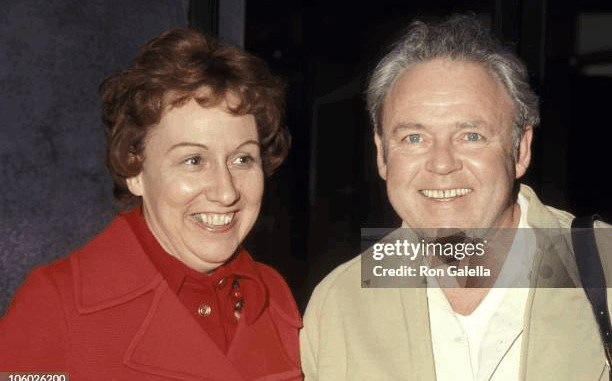
Few television duos have left a mark as lasting and meaningful as Jean Stapleton and Carroll O’Connor in All in the Family. As Edith and Archie Bunker, they brought to life one of TV’s most iconic couples—flawed, funny, and profoundly human. Their on-screen chemistry not only defined the success of the groundbreaking sitcom but also reshaped how audiences viewed relationships, marriage, and societal change in America.
Premiering in 1971, All in the Family broke new ground by tackling controversial topics with humor and honesty. At the center of it all were the Bunkers—Archie, the brash, opinionated patriarch played by O’Connor, and Edith, his kind-hearted and often underestimated wife, portrayed with masterful nuance by Stapleton. Together, they were lightning in a bottle: a perfect blend of comedy, conflict, and connection.
While their characters frequently clashed—Archie’s loud, stubborn rants contrasted sharply with Edith’s soft-spoken patience—Jean Stapleton and Carroll O’Connor had a deep mutual respect off-screen that elevated their performances. Their timing was impeccable, their emotions authentic, and their ability to play off each other turned simple domestic scenes into unforgettable television moments.
Stapleton’s Edith brought out a softer, more vulnerable side of Archie, humanizing him even when his opinions veered into the offensive. O’Connor, in turn, gave Archie just enough self-awareness and insecurity to allow Edith’s quiet strength to shine. It was this balance that kept viewers engaged, laughing, and often deeply moved.
Their partnership was not simply about laughs—it was about truth. Through their characters, Stapleton and O’Connor explored real issues: sexism, racism, generational divides, and the evolving roles of men and women in American society. And while Archie often stole the spotlight with his bluster, it was Edith who often delivered the emotional punches—thanks to Stapleton’s extraordinary ability to express pain, dignity, and hope in a single glance.
Behind the scenes, the two actors shared a professional camaraderie grounded in admiration. O’Connor often praised Stapleton’s intelligence and her unique ability to transform scripts into something deeply affecting. Stapleton, likewise, recognized O’Connor’s brilliance in creating a character that viewers loved to hate—and sometimes just loved.
Jean Stapleton left All in the Family in 1980, bringing Edith Bunker’s journey to a close. O’Connor continued the character’s story in Archie Bunker’s Place, but he often noted that the show never felt the same without Stapleton. Her departure marked the end of one of television’s greatest on-screen partnerships.
Today, decades later, the legacy of Jean Stapleton and Carroll O’Connor lives on—not only in reruns but in the way modern TV portrays relationships with complexity and authenticity. Together, they didn’t just make people laugh—they made people think, feel, and see the humanity in each other.
Their work was, and remains, a masterclass in character-driven storytelling.
